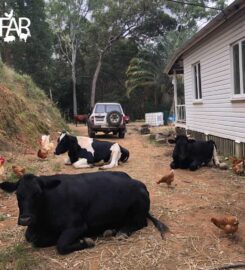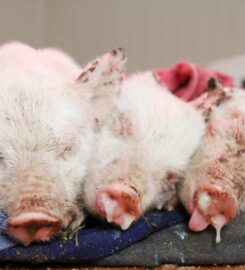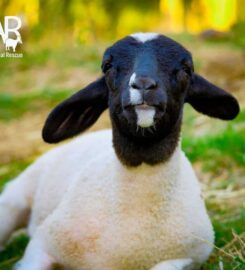Farm Animal Rescue
Farm Animal Rescue is a place of refuge for animals that have been freed from abusive situations and factory farms, each of which receives the best of life time care.
Farm Animal Sanctuary in Queensland
The farm is open to visitors on a regular basis, so that people can come to meet our residents. Each visitor has the opportunity to rub a pigs belly, pat a sheep, tumble around with a goat, and feed a rooster. During these animal contact sessions, we will tell visitors what the animals endured before they were rescued, and what life is really like for the millions of others on factory farms that we cannot save.
Animals for Adoption
Our Adoption Program allows people like you to provide lifetime care to animals rescued from the food industry. (If you are interested in providing financial support only please see our Sponsorship program.)
The animals we rescue are individuals who often require special care. Prospective carers need to meet the following criteria:
- current membership of an animal protection organisation
- proven ability to provide for the animals financially
- the existence of suitable housing, land and fencing
- proof of holding appropriate permits and PIC registration
- a good reference from a vet
- access to large animal veterinary services
- a vegetarian lifestyle and commitment to animal rights
- a commitment that no product derived from the animal will be offered for sale, consumption or profit
- a commitment to lifetime care.
(Please note that the adoption of laying chickens and female cattle, goats and sheep is available to vegan households only.) Minimum herd sizes apply, see below.
Where does my adopted farm animal come from?
Farm animals available for adoption may be from factory farms, saleyards, slaughterhouses, shelters, veterinary clinics or saved from being “strays”. The enormous number of farmed animals in Australia means that many animals are left behind, escape, become abandoned or dumped, or are simply not considered valuable enough to care for. Animals once rehabilitated become eligible for our Adoption Program and may require additional care.
How do I arrange an adoption visit?
What’s the adoption process?
- Complete the Adoption Application Form below.
- FAR will contact you to arrange a site visit, including an inspection of your home and the proposed area the animal would live in. If approved, you’ll be invited to spend an hour with our Animal Care Supervisor.
- Our Animal Care Supervisor will educate you on the important care standards for the adoptee.
- You will be placed on our Priority Approved Adopter register.
- FAR will contact you when an animal becomes available for adoption.
- Animals will be medically stabilised before adoption; however, you should still quarantine new arrivals. An adoption contract and movement paperwork will be issued at the time you adopt the animal(s).
Please note: immediate placement is unlikely. We cannot specify when an animal may be ready for adoption. We will contact you when an appropriate animal comes into our care to support your preparations.
What happens after adoption?
Following adoption, FAR staff will be available to assist you with any questions via a special email address and will provide expertise as you need it so that, together, we can ensure the best possible life for your new animal friend(s).
- Adoption fees $
- Application for inclusion in the program $50
- Adoption of hens/roosters $40 each
- Adoption of geese/ducks/turkeys $50 each
- Adoption of sheep or goats $60 each
- Adoption of cattle $100 each
- Adoption of pigs $120 each
- Transportation $1.32 per km
How do I get started?
Note that adoptable animals listed as 2019 were actually listed in 2020.
Apply to adopt a farm animal in need of a forever home and to be part of a caring family by clicking the button below.
Take a Tour of Farm Animal Rescue
Meet the chickens, goats, sheep, cows, pigs and other happy animals who have a forever home at the Farm Animal Rescue sanctuary!
Booking a tour on a Farm Animal Rescue Open Day is a great way to meet animals that have been rescued from the agriculture industry, hear their stories, and spend some time with our amazing residents.
*** BOOKINGS ARE ESSENTIAL. ALL VISITORS MUST HAVE A VALID TICKET FOR EACH PERSON TO ENTER THE SANCTUARY ***
Here are the details!
- The farm is open from 10am to 2pm
- Our Walking Safaris will depart the visitor area promptly at 10.30, 11.00, 12.30 and 1.00 and take around 90 minutes. Guests must be accompanied by a guide when visiting the animals. There are steep hills at the sanctuary and there is a significant amount of walking involved.
- If you arrive between tour times you will be required to wait in your vehicle until 15 minutes prior.
- a suggested $5 donation applies
- children under 15 must be supervised at all times as animals are free-ranging
- visitors wishing to see the cattle and pigs are required to navigate a steep path.
What to bring with you
- We suggest you bring sunscreen
- a hat and water
- We recommend that you wear long trousers.
- Fully enclosed shoes are MANDATORY
At the conclusion of the tour you will have the opportunity to purchase FAR and partner merchandise. We will also be offering pies, ice creams and drinks to take away. You can preview our merchandise options in our shop.
Many of the sanctuary animals come from intensive farming and other cruel situations. You will be required to sign a liability waiver when you arrive at the sanctuary.
For the animals and volunteers
Donations of fresh fruit and vegetables for the animals are welcome. We can only accept donations of apples, watermelons, bananas, grapes, strawberries, pumpkins, pears and carrots.
Food donations will be placed in our food store and must not be fed to the animals by visitors.
Donations of packaged frozen, refrigerated and shelf items for the sanctuary’s interns are also welcome. All donations for the interns must be vegan.
Merchandise
Important Notes
The sanctuary paddocks are hilly and there are rough paths. Visitors need to have at least an average level of fitness and good mobility to successfully complete the tour.
While visitors of all ages are welcome, tour content is designed for ages 13 to adult. Guardians of younger children must be prepared to take additional steps to ensure the safety of their children, and need to be aware that the tours contain accurate stories of each animal’s history, which some may find distressing.




